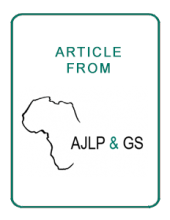Land Library
Welcome to the Land Portal Library. Explore our vast collection of open-access resources (over 74,000) including reports, journal articles, research papers, peer-reviewed publications, legal documents, videos and much more.
/ library resources
Showing items 1 through 9 of 12.Gender gap in ownership of agricultural land is still wide in many developing countries, mainly in favour of men. In some of these countries, both patrilineal and matrilineal systems are practised and recognized by governments.
The purpose of this study is to explore the challenges of women on land rights, in Tanzania customary practices often required woman to access land through their fathers, brothers, husbands or other men who control the land, so this makes women vulnerable and decreases agricultural productiv
This chapter investigated threats of statutory tenure on customary land. The study was primarily qualitative in nature and adopted a case study approach.
Effective reform pathways for addressing women’s access to land and tenure security in Africa are yet to be found despite their role in feeding the population.
Land capital occupies a prominent place in production activities in Africa. In forestry companies, women workers of production excellence, do not enjoy the same rights as the male agent in terms of access to land.
FONCIER EN MAURITANIE : SITUATION, DÉFIS ET QUÊTE D’ADAPTATION(Article scientifique)Par Dr Ousmane WAGUE, coordinateur du master « Migrations, gouvernance foncière et territoriale »Université de Nouakchott Al Asria SommaireLE FONCIER EN MAURITANIE 
Land and natural resource tenure security is a central yet often neglected area for economic development and poverty reduction in the developing world. Land is fundamental to the lives of poor rural people. It is a source of food, shelter, income and social identity.
Food insecurity has been a major global development concern. Hence, SDG Two seeks to achieve Zero Hunger by 2030. The situation is severe in sub-Saharan Africa, where customary practices deprive women of land ownership and limit their access rights.
The political dysfunction that had come to characterize an imploding Zimbabwean economy is beyond dispute.

